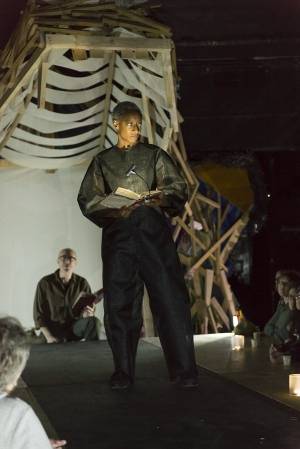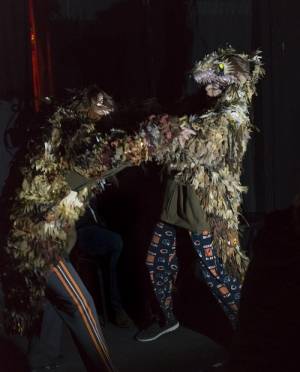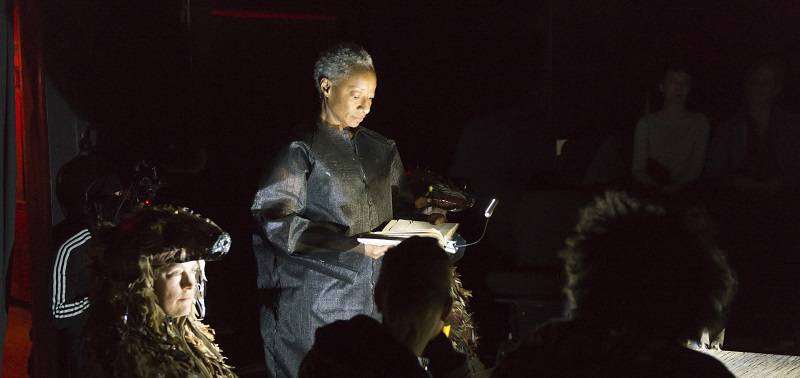The reason we had two people write the preview of BEAR earlier last week is that the Spring chapter is a continuation of a three-part venture. We were curious whether someone who hadn’t participated in any of the earlier installments would be interested or able to follow what’s being staged at the Station right now.
To that end, Sarah (who has not experience any previous Unreliable Bestiary) and Rebecca (who was an avid participant in both Fall and Winter) both went to the show separately to see how different their responses would be.
Rebecca: Even having written half the preview, I still didn’t feel certain about what to expect from BEAR:Spring Chapter. Deke said it would be people sitting around a table, drinking wine and eating cake with a lodge-type feel as people performed something akin to the rite of Persephone. Seems like I should work on my trust issues, because that is exactly what we got: table, benches, story, wine, ritual dancing. I was mesmerized by the giant sculpture of a bear, and the way the table seemed like its tongue, with the storyteller poised right in the gullet. Andy Warfel’s set was beguiling and vaguely threatening – just like a bear – providing a communal feel while also helping to focus our attention on the meat of the performance.
Sarah: BEAR slowly weaves together multiple narratives in order to explore nature and humanity. I found BEAR to be intense, emotional, purposeful, engaging, and interesting. Cynthia Oliver is charismatic as Clarice the bear. Her voice is strong and her purposeful movements draw your eyes. Her character as a bear-woman is in contrast to the man-bear in both the puppet interludes and Weaver’s narrative.
Rebecca: Aside from the Celine Dion jokes, Deke Weaver’s story was my favorite part of the Fall chapter, so I was glad that this performance was mostly about listening. If you’ve watched any of the BEAR videos, you know his appearance has changed quite a bit; that was a little sad for me, because the Father Time look really lent itself to gently describing the rough patch in the life of the man with the oak heart. This story, however, needed more insistence, more vitality, and the differences in appearance subtly powered the differences in the plot.
Sarah: I had a strong reaction to a visceral part of the narrative that illustrated the cruelty of humanity as a lesson of survival in nature. I wasn’t expecting to feel revulsion, anger, disappointment, and resignation. Deke Weaver delivers the moment like a storyteller at the height of the tale. He is loud, then quiet; aggressive-sounding, then soft. I wasn’t alone in my reaction. I noticed a few other audience members were agape as they listened intently to the story presented to them.
 Rebecca: Cycling through various methods of storytelling helped break up the intensity, something I think every audience member appreciated. Deke’s recounting was interrupted by shadow puppets, a dramatic play between him and Cynthia Oliver, and moments of ritual dance and movement provided by Jennifer Allen. One of the best things you could do after the performance would be to stay and take a closer look at the bear cub costumes worn by the dancers – those creations of Susan Becker’s are fascinating.
Rebecca: Cycling through various methods of storytelling helped break up the intensity, something I think every audience member appreciated. Deke’s recounting was interrupted by shadow puppets, a dramatic play between him and Cynthia Oliver, and moments of ritual dance and movement provided by Jennifer Allen. One of the best things you could do after the performance would be to stay and take a closer look at the bear cub costumes worn by the dancers – those creations of Susan Becker’s are fascinating.
Sarah: The musicians and other performers draw the audience further into the experience. The manipulated cello and bass give their low tones to create an ethereal, subterranean feel. The performers and assistants dressed as bears and rangers assist in harkening back to older parts of the BEAR project. Together Weaver, Allen, and the other performers and musicians weave the stories of the man-bears and bear-woman into a fitting conclusion.
Rebecca: The next best thing you can do after the performance is to accept the invitation to stay, eat, and chat with your neighbor. There may be times that you go out with friends after a show and talk about it afterwards, but it was incredible to have this incorporated into the expectation of the performance. It also feels pretty natural, even if you don’t know the person you’re next to on the bench, because you’ve all just come through something together. If it hadn’t been for the person sitting next to my boyfriend, I would not have discovered one of the other ways Camus’ The Stranger tied into the larger story. Having that conversation opened up quite a bit more of the meaning to me.
Sarah: Honestly, I am not one to enjoy performance art. I find it hard at times to connect with the artist’s message. In BEAR I found the elements of nature like the bear’s life cycle accessible. Once I realized what Weaver’s aim for the narrative was, I understood better what he meant by the “fluidity of animal/human attributes.” When I walked out of the project, however, I also realized that I could’ve used a very short refresher course in Albert Camus’ The Stranger before I walked into the Station Theatre… or taken a philosophy class at some point in my education. Nevertheless, I didn’t feel like I need The Stranger to understand the narratives and Weaver’s intentions.
Rebecca: There are moments, as in Fall, when you have to decide if you’re along for the ride or not. It gets weird, and maybe that feels uncomfortable, but it passes. What I liked about both installments, however, was that they were presented in ways that allowed for you to unobtrusively opt out if you didn’t think it was your thing. For Spring chapter, you don’t have to sit at the table if you don’t want, there is also regular seating. If you don’t want to participate, no one will see. If you prefer coffee to wine, that’s fine, and if you don’t want to drink anything, don’t take a cup. And if you don’t want to stay for cake, no one will make you. But…it’s cake.
It seems like BEAR:Spring Chapter has something to offer both the initiate and the seasoned participant. While the performance and story called back to earlier shows, that information wasn’t necessary to understand and even enjoy what was in front of us. Loose ends were tied up and information was re-given without being repetitive, but the story also stood on its own.
For your tickets to BEAR:Spring Chapter, make a reservation online at the Station Theatre, or call the box office at 217-384-4000 and leave a message. Ticket prices are $10 on Wednesday and Thursday, $15 on Friday and Saturday, 8 p.m. Feb. 22nd-25th. I’d suggest not only getting there early, but kinda edging toward the west end of the lobby, if you want a table seat. (You probably want a table seat)
Images provided by artists.








